- 22 January 2016
- Africa
-
(아프리카/감비아) 감비아 아프리카에서 두 번째로 이슬람 공화국 선포국제문제/아프리카 2016. 1. 26. 11:04
출처: http://www.bbc.com/news/world-africa-35359593
The Gambia: Africa's new Islamic republic 감비아 아프리카에서 두 번째로 이슬람 공화국 선포
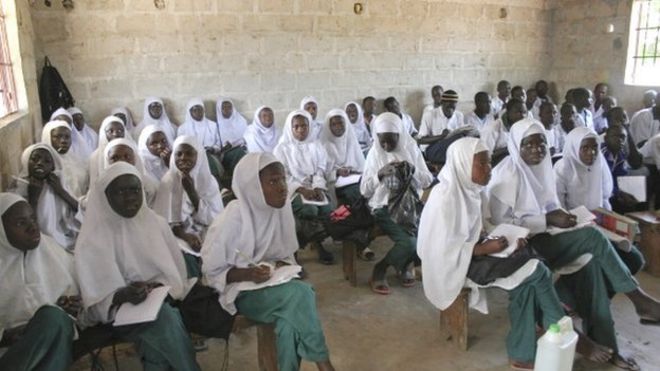 Getty Images
Getty ImagesThe majority of the population is Muslim The West African nation of The Gambia was declared an Islamic republic, in December, by its president. What are the implications for its people, and the region in general?
Why did The Gambian president declare the state an Islamic republic?
Gambia's President, Yahya Jammeh, declared his West African country an Islamic republic, at a political rally, on 11 December - making it Africa's second, after Mauritania. 감비아 대통령 야흐야 자메흐가 아프리카에서 마우리타니아에 이어 두 번째로 작년 12월11일 정치집회 도중 이슬람 공화국을 선포했다.
The president justified his announcement by saying he was breaking from The Gambia's colonial past. 이슬람 공화국 선포의 목적은 식민지배 받았던 과거를 청산한다는 의미.
The announcement was unexpected and similar to President Jammeh's decision to leave the Commonwealth in 2013 (after 48 years membership), which he also justified as an effort to fully decolonise. 이번 조치는 2013년 영연방(48년간 영연방이었던)을 탙퇴하겠다는 결정만큼 충격적이고, 탈식민화 하는 노력이라고 정당화했다.
These announcements came at moments when President Jammeh's international relations but also domestic politics were increasingly strained, not helped by a deteriorating economy with a growing public-debt burden, which according to the IMF, reached about 100% of GDP at the end of 2014. 경색되다
President Jammeh had enjoyed close relations with Libya's late leader Muammar Gaddafi, and Tripoli provided significant aid and cash.
And, in July 2009, the president bestowed The Gambia's highest order, the Grand Commander of the Order of the Republic of The Gambia, on Gaddafi. 2009년에 가다피에게 최고의 예우를 갖추었다.
But President Jammeh surprised everybody in February 2011 by calling on him to resign as the Arab Spring began to hot up. 그러나 아랍의 봄이 무르익던 2011년 돌연 가다피에서 물러나라고 촉구하여 모든 이를 놀라게 만들었다.
Losing Gaddafi's money punched a big hole in The Gambia's budget.
The president also broke off relations with Taiwan, in 2013, after it refused to provide more money to bail him out. 2013년 대만과 외교관계를 단절했다. 대만이 더 많은 돈으로 구제금융을 해주지 않았다는 이유에서.
He had probably hoped China would reward him for rupturing relations with Taipei, but this has not happened. 그래서 대만과의 외교단절에 대해 중국이 보상을 해줄 것으로 기대를 했으나 아무 일도 없었다.
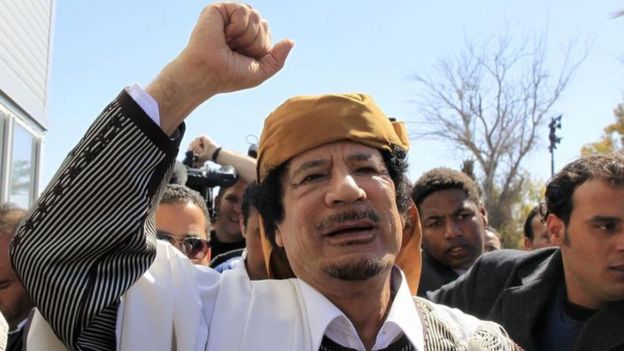 Reuters
ReutersLibyan leader Muammar Gaddafi was once feted in The Gambia The Gambia also ended relations with Iran, in 2010, resulting in the cancellation of trade and aid projects such as the $2bn (£1.2bn) agreement to supply The Gambia with heavy and commercial vehicles. 2010년에는 이란과도 외교관계를 단절했다.
This has left The Gambia needing new allies.
Turkey is one of the few that remains loyal, and President Jammeh went to Ankara on a state visit in 2014.
The Turkish Armed Forces have trained the Gambian gendarmerie force since 1991, and Gambian soldiers train in Turkey to this day.
Wooing the Gulf States and improving relations with Saudi Arabia seems to be part of President Jammeh's search for new friends.
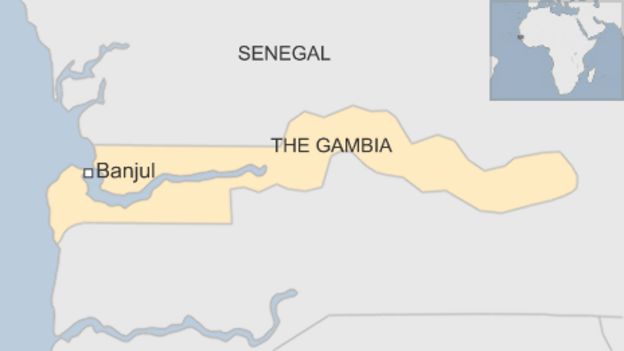
The Gambia announced in December it would accept Rohingya refugees from South East Asia as part of its "sacred duty", hoping this and becoming an "Islamic republic" opens cheque books and replaces past allies such as Libya, Iran and Taiwan.
In December 2016, President Jammeh faces presidential elections. 금년 12월 대통령 선거가 있다.
Playing up his Islamic credentials helps internationally but will also have a resonance domestically as 90% of Gambians are Muslim.
What are the practical implications for individuals and society in the country?
Given that President Jammeh's announcement appears to have been made on a whim, there is a lot of uncertainty on what type of "Islamic republic" The Gambia will become.충동적으로 행하다
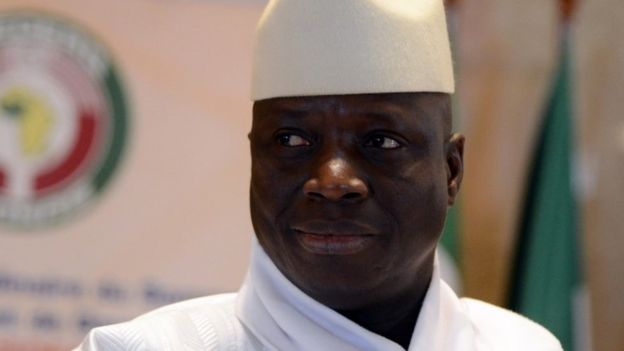 Getty Images
Getty ImagesPresident Yahya Jammeh:
- born in May 1965 출생
- seized power in a coup in 1994 만 29세로 정권 장악
- vowed to stay in power for "a billion years", if God wills 신이 원하면 영구집권하겠다고 마음먹다
- claimed in 2007 he could cure Aids and infertility with herbal concoctions 약초혼합물로 에이즈와 불임을 치료할 수 있다고 2007년 주장했다
- warned in 2008 that gay people would be beheaded 2008년 게이들은 목을 벨 거라고 경고
- declared The Gambia an Islamic republic in 2015
The country still has a secular constitution and a legal system based on English common law.
Some aspects of traditional law and Sharia also apply, but Sharia does not apply to non-Muslims without consent.
A 4 January 2016 executive directive that all female government staffers must cover their hair during office hours was quickly rescinded after its sparked anger among opposition leaders, activists and pro-democracy groups.
The state broadcaster now regularly describes The Gambia as an "Islamic republic", and the country's Supreme Islamic Council has welcomed the change of status.
It is not clear if the introduction of fully fledged Sharia is planned (non-Muslims were reassured in December) and whether there will be a referendum to amend the secular constitution.
But the national flag will certainly be changed to reflect the country's new status.
Does it make it more likely that fundamentalism and extremism will take hold?
It is unlikely to have any impact immediately, as tourism is a prime source of revenue and President Jammeh runs the country with an iron fist.
It is more likely frustrated young Gambians will over time become even more vulnerable to being radicalised because this "Islamic republic" will offer little new and growing inequality, poverty and the lack of jobs will remain pervasive.
What impact will it have on the region?
Relations with neighbouring Senegal are poor, and The Gambia is isolated within the regional bloc, the Economic Community of West African States (Ecowas).
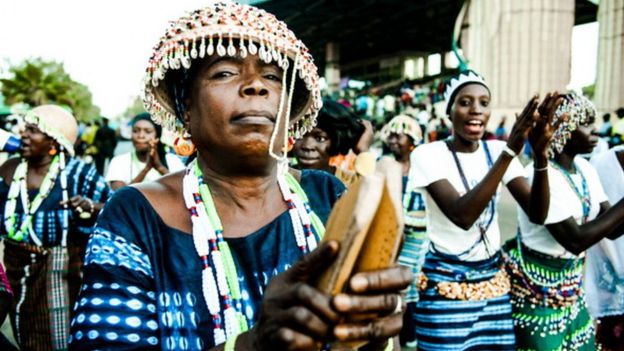 Getty Images
Getty ImagesInternational Roots Festival was set up to teach people about Gambian music, culture and customs 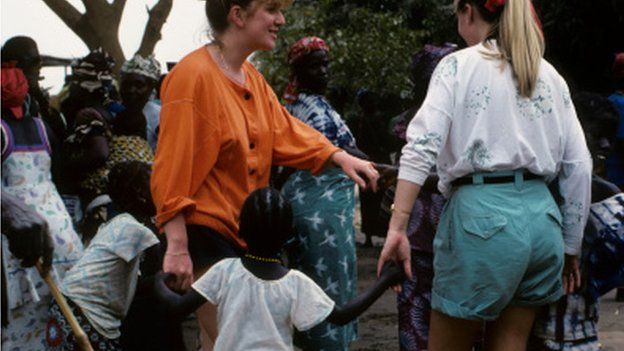 Wolfgang Kaehler
Wolfgang KaehlerTourism is an important industry in The Gambia An attempt by Ecowas, in 2015, to introduce term limits on presidents from the region was blocked by President Jammeh and his Togo counterpart, but highlighted their isolation.
President Jammeh has ruled the country since seizing power through a coup in 1994 and seems to have no ambition to retire from being The Gambia's leader.
Longer-term, the biggest single threat to The Gambia is climate change as Banjul risks becoming Atlantis because of rising sea-levels.
Already, prime beaches are being visibly degraded, and this is impacting tourism.
What does it mean for the West?
Relations with the West are already poor because of concerns about human rights abuses:
- The Gambia has pulled out of the Commonwealth because of pressure over its rights record
- The US has suspended The Gambia's participation in the African Growth and Opportunity Act (AGOA) over rights issues
- In December 2015, the EU halted some $16m (£11m) in development assistance because of human rights
The Gambia had already expelled the EU charge d'affairs, in June.
The Gambia was never really strategic to the West, which is mostly indifferent to what happens there.
Dr Alex Vines OBE is Head of the African Programme, Chatham House.
'국제문제 > 아프리카' 카테고리의 다른 글
(아프리카) 짐바브웨의 대통령 무가베는 페미니스트인가? (1) 2016.02.08 (아프리카/하이티) 하이티 대통령선거 세 번씩이나 연기 (0) 2016.01.26 (아프리카) 가나정부 미국 관타나모 출신 예맨 재소자 2명 자국 거주하도록 허락 (0) 2016.01.20 (아프리카/부키나파소) 아프리카 부키나파소 호텔 외국인 투숙객 여러 명 총격 사망 (0) 2016.01.17 (아프리카) 브룬디의 보복(맞대응)차원의 살상공격 사회에 공포 조성 (0) 2015.12.15